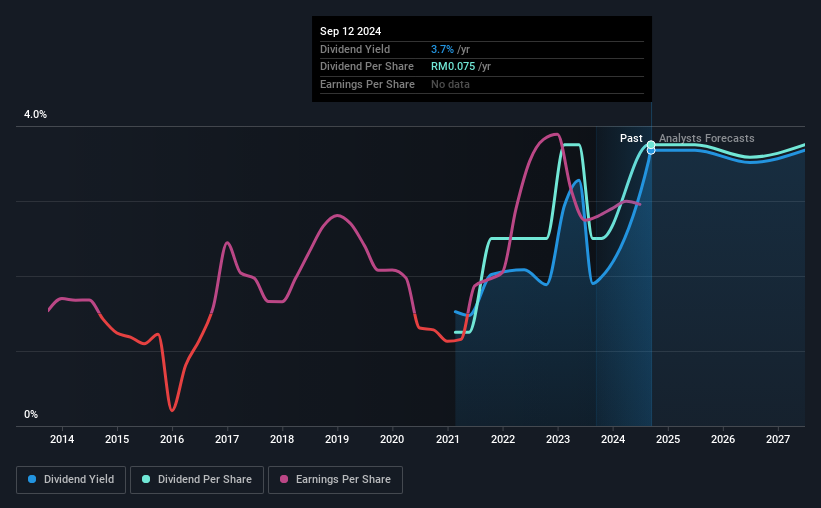- Malaysia
- /
- Oil and Gas
- /
- KLSE:HIBISCS
Hibiscus Petroleum Berhad (KLSE:HIBISCS) Will Pay A Dividend Of MYR0.015
The board of Hibiscus Petroleum Berhad (KLSE:HIBISCS) has announced that it will pay a dividend on the 25th of October, with investors receiving MYR0.015 per share. The dividend yield is 3.7% based on this payment, which is a little bit low compared to the other companies in the industry.
View our latest analysis for Hibiscus Petroleum Berhad
Hibiscus Petroleum Berhad's Future Dividend Projections Appear Well Covered By Earnings
It would be nice for the yield to be higher, but we should also check if higher levels of dividend payment would be sustainable. However, prior to this announcement, Hibiscus Petroleum Berhad's dividend was comfortably covered by both cash flow and earnings. This means that most of its earnings are being retained to grow the business.
The next year is set to see EPS grow by 12.7%. If the dividend continues on this path, the payout ratio could be 17% by next year, which we think can be pretty sustainable going forward.

Hibiscus Petroleum Berhad's Dividend Has Lacked Consistency
Even in its short history, we have seen the dividend cut. Since 2020, the dividend has gone from MYR0.025 total annually to MYR0.075. This works out to be a compound annual growth rate (CAGR) of approximately 32% a year over that time. Hibiscus Petroleum Berhad has grown distributions at a rapid rate despite cutting the dividend at least once in the past. Companies that cut once often cut again, so we would be cautious about buying this stock solely for the dividend income.
The Dividend Looks Likely To Grow
Given that the dividend has been cut in the past, we need to check if earnings are growing and if that might lead to stronger dividends in the future. We are encouraged to see that Hibiscus Petroleum Berhad has grown earnings per share at 10% per year over the past five years. Hibiscus Petroleum Berhad definitely has the potential to grow its dividend in the future with earnings on an uptrend and a low payout ratio.
Hibiscus Petroleum Berhad Looks Like A Great Dividend Stock
Overall, we like to see the dividend staying consistent, and we think Hibiscus Petroleum Berhad might even raise payments in the future. The company is easily earning enough to cover its dividend payments and it is great to see that these earnings are being translated into cash flow. All in all, this checks a lot of the boxes we look for when choosing an income stock.
Companies possessing a stable dividend policy will likely enjoy greater investor interest than those suffering from a more inconsistent approach. Still, investors need to consider a host of other factors, apart from dividend payments, when analysing a company. For example, we've picked out 1 warning sign for Hibiscus Petroleum Berhad that investors should know about before committing capital to this stock. If you are a dividend investor, you might also want to look at our curated list of high yield dividend stocks.
Valuation is complex, but we're here to simplify it.
Discover if Hibiscus Petroleum Berhad might be undervalued or overvalued with our detailed analysis, featuring fair value estimates, potential risks, dividends, insider trades, and its financial condition.
Access Free AnalysisHave feedback on this article? Concerned about the content? Get in touch with us directly. Alternatively, email editorial-team (at) simplywallst.com.
This article by Simply Wall St is general in nature. We provide commentary based on historical data and analyst forecasts only using an unbiased methodology and our articles are not intended to be financial advice. It does not constitute a recommendation to buy or sell any stock, and does not take account of your objectives, or your financial situation. We aim to bring you long-term focused analysis driven by fundamental data. Note that our analysis may not factor in the latest price-sensitive company announcements or qualitative material. Simply Wall St has no position in any stocks mentioned.
About KLSE:HIBISCS
Hibiscus Petroleum Berhad
Engages in the exploration, development, and sale of oil and gas in Peninsular Malaysia, Sabah, Malaysia, the United Kingdom, Brunei, Australia, and Vietnam.
Undervalued average dividend payer.
Similar Companies
Market Insights
Community Narratives




